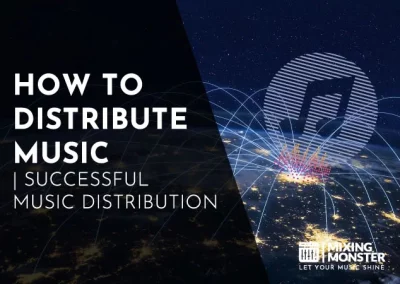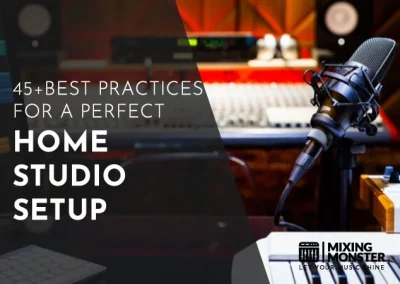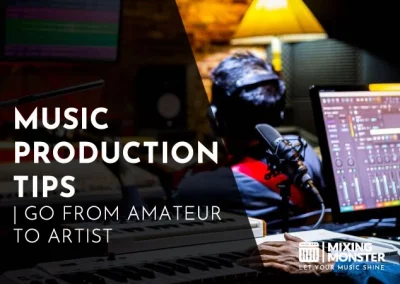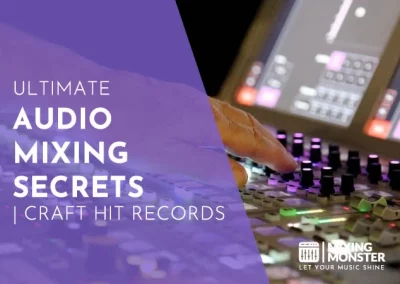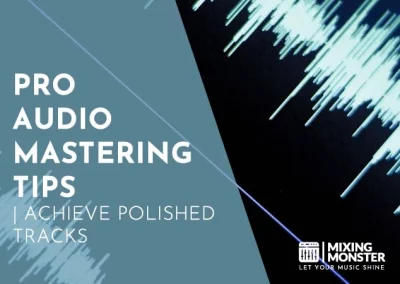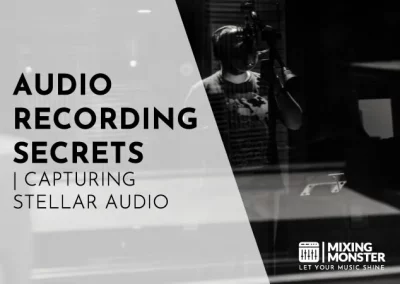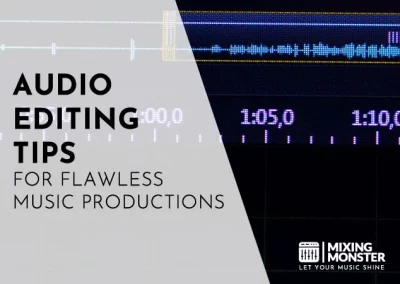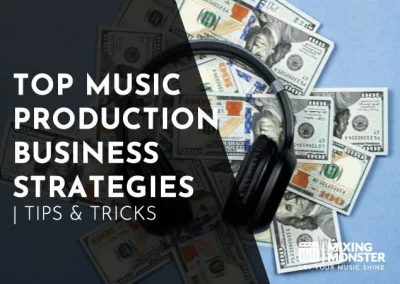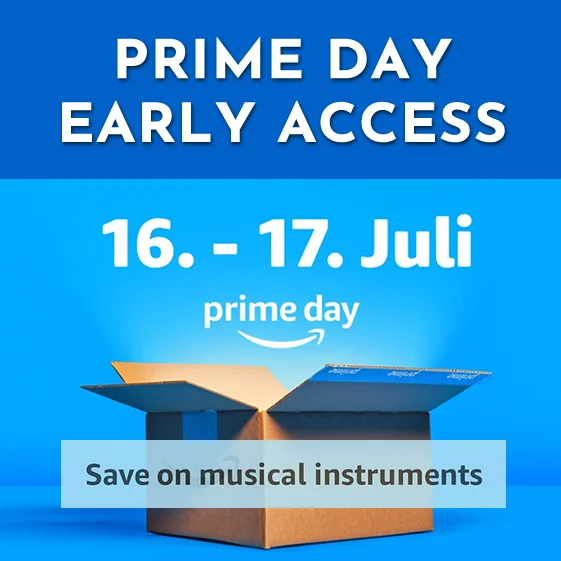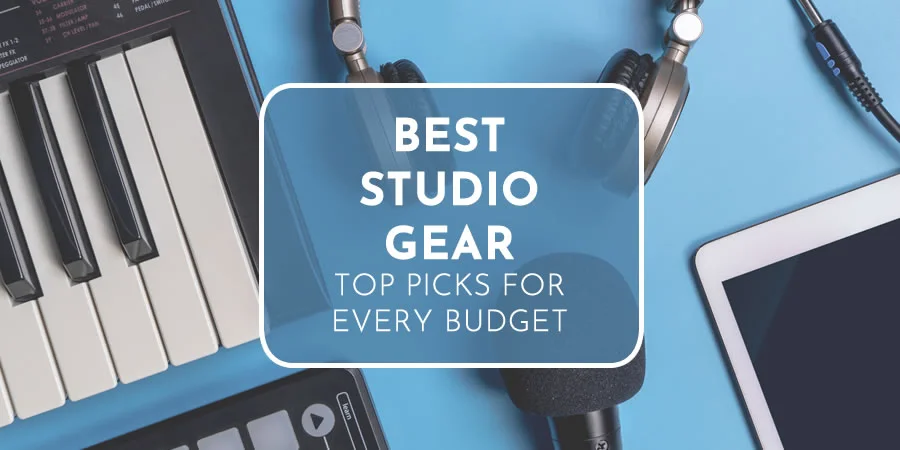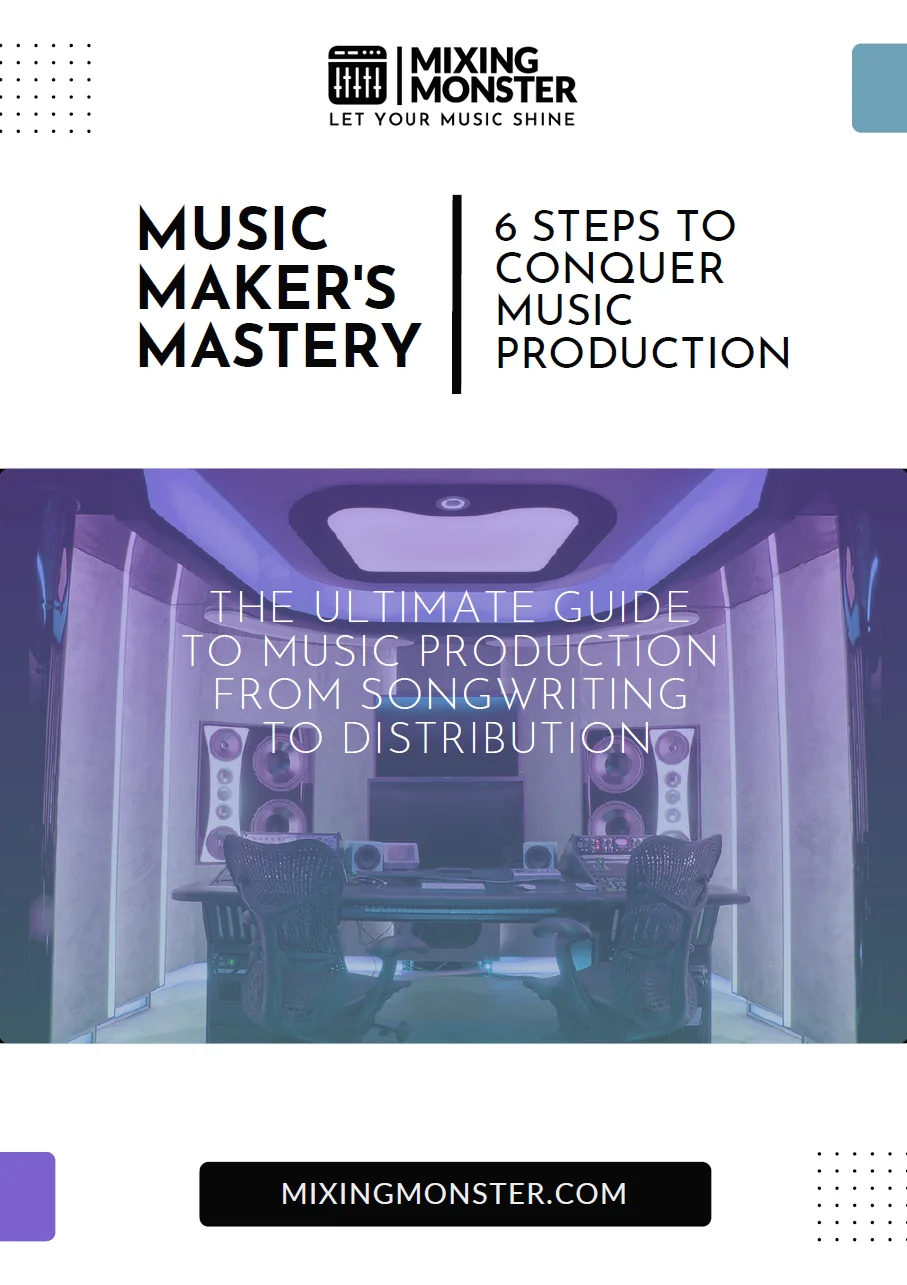Home > Blog > Music > Music Industry
Disclosure: Some of the links below are affiliate links, meaning that at no additional cost to you, we will receive a commission if you click through and make a purchase. Read our full affiliate disclosure here.
Achieving success in the music industry is often as much about mindset as talent. A successful musician’s mindset encompasses a range of attributes, practices, and perspectives that together form a foundation for sustained artistic achievement. Let’s explore how nurturing the right mentality can influence your journey in music.
The mindset of a successful musician is predicated on continual growth, resilience, and strategic thinking. It involves developing skills crucial for navigating the business aspects of music, such as marketing and branding, coupled with an unwavering commitment to artistic development. Professionalism, networking, and collaboration are also integral, as is balancing personal well-being and career advancement. By internalizing these facets, musicians can transform their passion for music into tangible success.
As you delve further into this article, anticipate enlightening perspectives on nurturing your abilities, cultivating a professional attitude, and maximizing opportunities for networking and collaboration. The insights offered will guide you toward leveraging the full power of branding and marketing in the music sphere while maintaining your equilibrium for enduring success.
KEY TAKEAWAYS:
- Continuous personal and professional development is crucial.
- Professionalism and strategic networking are critical to industry success.
- Balancing well-being with career goals is essential for sustainability.
Table Of Contents
1. Developing The Mindset Of A Successful Musician
2. Cultivating A Professional Attitude
3. Harnessing The Power Of Music Marketing And Branding
4. Networking And Collaboration Opportunities
5. Balancing Personal Well-Being And Professional Growth
6. Turning Musical Passion Into Sustainable Success
7. FAQ

1. Developing The Mindset Of A Successful Musician
In the competitive music business landscape, honing specific essential skills can significantly improve one’s chances of success.
Mastering Your Instrument
You must have a profound understanding of your instrument to excel in music. Regular practice allows you to deepen your technical proficiency and expressive capabilities. Consider the 10,000-Hour Rule, which suggests mastery in any field requires extensive, dedicated practice.
Expanding Your Musical Creativity
Your ability to innovate and create unique sounds is invaluable. Developing this skill calls for experimentation and the courage to try new approaches. A Successful musician doesn’t shy away from exploring different genres and techniques that contribute to their musical growth.
Embracing Lifelong Musical Learning
Continuously expanding your knowledge and experience in music ensures sustained career growth. Networking and learning from others, attending workshops, and embracing new musical theories contribute to your versatility and adaptability as a musician.
Essential Skills in the Music Business:
- Technical Proficiency:
Become adept at your instrument through structured practice. - Musical Theory Knowledge:
Understand the foundations that music is built on. - Performance Skills:
Cultivate the ability to perform with confidence and presence. - Business Acumen:
Learn the business aspects of music, such as marketing and monetization. - Social Skills:
Build a network and maintain relationships within the industry. - Creativity:
Innovate and create music that resonates and feels authentic. - Resilience:
Navigate setbacks with a positive attitude and learn from criticism.
2. Cultivating A Professional Attitude
Adopting a professional attitude as a musician is pivotal to your success. It involves setting concrete goals, embracing growth, and resiliently handling the inevitable challenges of criticism and rejection.
Setting And Achieving Musical Goals
To succeed, clearly define your musical goals. Start with specific, measurable, achievable, relevant, and time-bound (SMART) objectives.
For instance, you might aim to master a complex piece within three months or book at least four gigs per month. By listing your goals and tracking your progress, you maintain a focused roadmap that guides your efforts and keeps you motivated.
Example Of A SMART Goal For Musicians:
- Specific:
Master the complete “Moonlight Sonata” by Beethoven. - Measurable:
Learn one movement every month. - Achievable:
Practice for two hours daily. - Relevant:
Beneficial for classical concert repertoire. - Time-Bound:
Complete in three months.
Maintaining A Growth Mindset
Adopting a growth mindset means understanding that your musical abilities can be developed through dedication and hard work. View challenges as opportunities rather than obstacles. For instance, learning to play a new instrument adds depth to your skill set and can open doors to collaborative projects. Embrace that your musical path is a journey of continuous learning.
Tips to Maintain a Growth Mindset:
- Stay Curious:
Always be open to new techniques and genres. - Persistence:
Keep pushing your boundaries, even when it’s challenging.
Handling Criticism And Rejection
Every musician encounters criticism and rejection; what matters is your response. Cultivate a thick skin to weather negative feedback while recognizing its constructive elements. Acknowledge that not every audition will succeed, but each can teach you something valuable. Use these experiences to refine your skills and approach, reinforcing your commitment to your craft.
Strategies For Handling Rejection:
- Reflect:
Analyze the feedback objectively to identify areas for improvement. - Resilience:
Reaffirm your passion and remind yourself why you embarked on this path.
3. Harnessing The Power Of Music Marketing And Branding
In this digital age, your success as a musician depends on your talent and how effectively you market your brand. This section delves into the strategic use of social media and developing a strong, recognizable brand that resonates with your audience.
Leveraging Social Media Platforms
Social media is indispensable for connecting with your audience and promoting your music. Each platform offers unique features for engaging fans:
- YouTube:
It’s essential for sharing high-quality music videos and behind-the-scenes content. This platform allows you to build a subscriber base that can be notified instantly when you release new content. - TikTok:
Known for its viral potential, this is where you can gain exposure quickly by tapping into trending hashtags and challenges. Be authentic and creative with your posts to stand out.
Music marketing strategies on social media should include a content calendar, targeted ads, and analytics to measure the success of your campaigns.
Developing A Strong Brand
Your branding is what sets you apart in the music industry. It includes your visual identity, story, and the emotions you evoke through your music. To develop a strong brand:
- Visual Identity:
Ensure consistency in your album covers, promotional materials, and social media profiles. - Storytelling:
Share your journey, inspiration, and process. Illustrative stories create an emotional bond with your audience.
Remember, a strong brand is recognizable and can hugely influence the success of your marketing efforts. Monitor how your brand is perceived and pivot as needed to stay relevant to your audience.
4. Networking And Collaboration Opportunities
Networking and collaboration are vital for your success in the fast-paced music industry. Maximizing these opportunities is crucial for professional musicians seeking to advance their careers.
Building Music Industry Relationships
Networking:
Being a professional musician involves more than talent; it requires establishing authentic relationships within the music industry. When you network, focus on engaging in meaningful conversations with the parties involved.
Start by attending industry events, joining music forums, and connecting on social media. The aim is to make contacts offering tangible business advantages such as record label interest or live performance opportunities.
- Attend music conferences and workshops to meet industry professionals.
- Join online communities like Splice, where musicians exchange ideas and opportunities.
- Use social media to follow and interact with other artists and industry figures.
Remember that communication is a two-way street:
- Listen as much as you talk.
- Exchange ideas.
- Show genuine interest in others’ work.
Effective networking leads to opportunities for collaboration, which can broaden your exposure and skill set.
Collaborative Music Projects And Learning
Collaborative projects are an excellent way to learn new skills and diversify your music portfolio. By working with others, you gain insights into different musical styles and production techniques, which can be indispensable in your growth as a musician.
Take action to initiate projects or respond to those seeking collaborators and harness opportunities to co-create with other artists who share your vision.
- Seek collaboration opportunities that align with your style and goals.
- Engage in projects that challenge you artistically and push you out of your comfort zone.

5. Balancing Personal Well-Being And Professional Growth
To thrive in the music industry, you must master professional growth and personal well-being. Striking the right balance ensures longevity and fulfillment in your career.
Time Management And Work-Life Balance
Time management is essential in maintaining a harmonious blend between your personal life and escalating career demands. As a musician, setting aside time for practice and creation is vital, but scheduling rest and family time is equally important. Consider the following:
- Establish A Routine:
Stick to a daily schedule that allocates specific time blocks for work and relaxation. - Prioritize Tasks:
Focus on activities that foster professional development and delegate or eliminate less critical tasks.
Mental Health And Resilience In The Music Industry
Your mental health underpins your ability to be resilient and emotionally aware. The pressures of the music world are relentless, making it crucial to develop strategies to protect your well-being. Here are some tactics:
- Build Resilience:
Cultivate patience and maintain a positive mindset in the face of setbacks. Regularly engaging in mindfulness can reinforce your resilience. - Support Networks:
Surround yourself with supportive peers who understand the industry’s stresses and can provide counsel when needed.
6. Turning Musical Passion Into Sustainable Success
Turning your love for music into a lasting and prosperous career is challenging and rewarding. Success as a musician requires talent and passion, strategic financial planning, adaptability to industry changes, and proactive career management.
Formulating A Financial Plan
To make a living from your music, create a robust financial plan. This should include diverse income streams such as live performances, streaming revenue, merchandise sales, and teaching. Budget for essential expenses, such as equipment and travel, and anticipate potential risks by setting aside savings for lean times.
Adapting To Change And Technological Advancements
The music industry is dynamic, and being open to change can provide new directions for your career. Embrace technological advancements, whether using social media for marketing or leveraging the latest music production software to refine your sound. Staying current with tech trends can differentiate your brand and keep you relevant.
Proactive Music Career Management
Proactively managing your career means engaging with fans, constantly networking, and seeking new opportunities. Use the following table as a guide to manage your career effectively:
| Activity | Description | Frequency |
|---|---|---|
| Networking | Connect with other professionals, from producers to venue owners. | Weekly |
| Social Media | Update your profiles with fresh content to engage your audience. | Daily |
| Skill Improvement | Practice your instrument, take vocal lessons, or explore new music genres. | Daily |
| Marketing | Release promotional materials, like posters and teasers for upcoming events. | As Needed |
| Learning | Keep abreast of industry news and attend music conferences. | Monthly |
Understanding these traits, habits, and necessary skills can significantly impact your journey to excel in the music industry!
7. FAQ
1) What personal traits are essential for professional musicians?
As a professional musician, you need to be adaptable and detail-oriented. Resilience and openness to learning are crucial traits that can benefit you significantly in this competitive field.
2) How can an aspiring musician cultivate a success-oriented mindset?
To cultivate a success-oriented mindset, focus on setting clear goals and practicing daily. Embrace learning and view each experience as an opportunity to improve. Your mindset should include patience and determination, as success in music often takes time.
3) What habits do successful musicians typically have in common?
Successful musicians often share habits such as continuous learning and practice. They also dedicate time to refining their craft and staying updated with new music technology and techniques. Constructive self-criticism and effective time management are also everyday habits among top artists.
4) Which core skills should musicians develop to enhance their careers?
Foundational skills like music theory and performance are essential. Enhancing your skills in songwriting, production, and the use of new technologies will also significantly improve your versatility and marketability as a musician.
5) How important is perseverance in the music industry?
Persistence is critical in the music industry. Facing rejection and overcoming setbacks is a part of your growth. Patient progress and resilience will help you navigate the challenges and keep moving toward your goals.
6) What role does collaboration play in a musician's success?
Collaboration can exponentially increase your opportunities, learning, and exposure. Working with others opens avenues for creative growth and networking. It enriches your music by bringing in diverse perspectives and plays a pivotal role in establishing a foothold in the industry.



